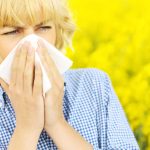Hashimoto’s Thyroiditis: The Impact of Nutrition
2021 Student Scholarship – Third Place Case Study
PRINCESS BURNETT
JENNIFER GREEN, ND
Hashimoto’s thyroiditis is an inflammatory autoimmune disease in which the immune system forms antibodies to thyroid peroxidase and thyroglobulin. The resulting T and B lymphocytic infiltration and inflammation causes scarring and destruction of tissue within the thyroid gland, as well as impaired thyroid function.1 The immune attack on the thyroid includes increased production of reactive oxygen species (ROS) through nicotinamide adenine dinucleotide phosphate (NADPH) oxidase.2 ROS are essential for the synthesis of thyroid hormones2; however, prolonged interaction between nuclear residues and ROS increases autoantibody production and decreases concentrations of antioxidant minerals and vitamins within the body.3 It thus makes sense that supporting the body by replenishing these nutrients might have a positive impact on the disease.
The exact etiology of Hashimoto’s disease is not fully understood; however, genetic susceptibility is believed to play a role, as confirmed by family and twin studies.4 Prevalence of Hashimoto’s increases with age and affects females more than males; the female-to-male ratio is around 10:1.5 Women aged 30-50 are the most susceptible; however, this disease can occur at any age.5 Data suggest that 79% of the predisposition for Hashimoto’s disease is due to genetic factors and the remaining 21% is due to environmental and sex hormone influences.5 Environmental factors contributing to the production of anti-thyroid antibodies can include exposure to endocrine-disrupting chemicals, heavy metals, and nutrient deficiencies.1 Individuals with a family history of thyroid autoimmunity are at increased risk of this disease.6 The symptomology of Hashimoto’s thyroiditis includes fatigue, sensitivity to cold, constipation, muscle weakness, and dry skin dry.1 Psychological symptoms can include depression, concentration problems, and mood changes.1
Thyroid dysfunction may be clinically apparent in 0.1-2% of the population or may present subclinically, with a prevalence of 10-15%.7 Oxidative stress may be a key contributing factor in the development of thyroid autoimmunity.1 As indicated above, oxidative stress (ie, ROS) stimulates inflammation and promotes cellular destruction within the thyroid gland, underscoring the importance of antioxidants such as glutathione and selenium for protection.1 Patients with Hashimoto’s may experience a decrease in antioxidant enzyme synthesis due to decreased thyroid hormones.2 This disease necessitates a diet that supports the immune system by regulating inflammatory processes. This often means making changes in meal selection and removing antigenic foods.1 The most common nutritional deficiencies found in patients suffering from Hashimoto’s thyroiditis are iodine, selenium, magnesium, the B vitamins, and vitamins A, C, and D.1
Case Study
History & Presentation
LH, a 26-year-old Hispanic female, presented to the National University of Health Sciences clinic seeking naturopathic care. LH had been diagnosed with underactive thyroid disease 3-4 years prior by her primary care provider (PCP). She was concerned that her condition had worsened since being diagnosed. LH had a family medical history of underactive thyroid disease on her mother’s side of the family. Her thyroid-stimulating hormone (TSH) levels had been elevated for 3 years (her most recent TSH measured 4.81 mIU/L). Some of the symptoms she was experiencing included chilliness, hair loss, anxiety, weight loss of 28 pounds over 8 months, headaches with left-sided head pain that radiated around the left ear, and weakness in the right arm. She reported that a neurologist had checked her vitamin B levels 2 years prior due to the right arm weakness and that she was prescribed oral vitamin B12 based on a low level. To support her thyroid function, her PCP had given her a proprietary thyroid glandular product and a product containing artemisinin and sarsaparilla extract, to be taken orally. During the visit, she expressed that she suffered from significant stress due to concerns about her health. She rated her stress level as 8-9/10 (10 being the worst).
LH’s additional concerns included facial acne, depression, and anxiety. She also reported that she had normal bowel movements as often 1-2 times per day but experienced occasional constipation. She had used antibiotics for 2 years, initially because her PCP suspected an infection, but then continuing them because she believed they were relieving her seasonal allergies. LH reported that she placed herself on the BRAT (banana, rice, applesauce, toast) diet for 6 months because she thought it would help to reduce her acne breakouts. She stopped the diet, however, when it seemed to be making her symptoms worse.
Assessment
On physical examination, LH had normal vital signs. Upon palpation of the scalp, no lesions were noted; however, the hair texture at the top of her head was thin. She had acne lesions on her face, supple skin turgor, and showed normal capillary refill of the nail beds. Lymph node exam was unremarkable. Thyroid exam was unremarkable for enlargement or nodules. Cardiac and lung exams were unremarkable. The neurological exam was also unremarkable.
Based on LH’s presenting symptoms, diagnostic tests were ordered for assessment. Complete blood count, comprehensive metabolic profile, and lipid panel results were all within normal limits. A full thyroid panel was ordered for a complete evaluation of thyroid function. TSH was elevated at 7.6 mIU/L. Total triiodothyronine (T3), total thyroxine (T4), free T4 (FT4), and free T3 were within normal limits. Thyroid peroxidase (TPO) antibodies were significantly increased at >900 IU/mL, indicating autoimmunity. Thyroglobulin antibodies were also elevated, at 4 IU/mL (RR, <1 IU/mL), further suggesting an autoimmune process. Thyroglobulin levels were within normal limits; however, the levels were in the lower end of the normal range.
Diagnosis
The working diagnosis for LH was Hashimoto’s thyroiditis, based on the elevated TSH, and positive TPO and thyroglobulin antibodies. LH had also experienced significant weight loss. Differential diagnoses included alopecia areata, hyperthyroidism, and malnutrition. The elevated TSH and normal FT4 made a diagnosis of hyperthyroidism less likely. Alopecia areata was a possible diagnosis because of her thinning hair; however, no patterns of baldness were noted on examination of the scalp, making this diagnosis less likely. Malnutrition was another possibility, due to her history of antibiotic usage and extensive consumption of the BRAT diet; additional laboratory testing was warranted to confirm the diagnosis.
Based on her presentation, the center of gravity in this case was the immune system attacking the thyroid gland. Some of LH’s disturbed determinants of health included diet, sleep, hydration, emotional stress level, and exercise. LH’s history of antibiotic use could have disturbed her gut function and caused nutrient depletion that could be contributing to her symptoms. Some of the obstacles to cure were her high stress levels and her reluctance to make dietary adjustments. Her prognosis was expected to improve with conservative care, ie, making the necessary lifestyle changes to improve her condition.
Treatment
The goal of treatment was to reduce symptoms of low thyroid by making lifestyle changes and providing nutrients that support immune function and reduce oxidative stress. Dietary recommendations for LH included eating a whole-foods diet of fruits, vegetables, moderate protein, gluten-free grains, and healthy fats. Other recommendations included avoiding dairy, gluten, and goitrogenic foods. Goitrogens are substances that can disturb thyroid hormone production by blocking iodine uptake within the gland.8 Additional dietary recommendations were to increase iodine-rich foods such as seafood at least 2 times per week and to increase water intake to at least 60-70 ounces daily.
Lifestyle recommendations included increasing cardio exercise to 30-40 minutes daily, as well as managing stress through meditation, journaling, and/or enjoyable activities. Additional treatment recommendations included constitutional hydrotherapy twice weekly, naturopathic counseling once per week, and once-weekly physical medicine, including manual therapy and spinal adjustments to the cervical and thoracic areas. Several supplements were also recommended (see Table 1)
Table 1. Supplement Recommendations
| Supplements | Dose |
| Cod liver oil | 1 tbsp/day with meals |
| B-complex | 2 caps/day |
| Zinc picolinate | 1 cap/day |
| Proprietary blend of plant sterols & sterolins | 3 caps/day away from food |
| Probiotic | 1 cap/day for 1 week; increase to 2 caps/day during 2nd week |
| Proprietary blend of nutrients and botanicals to support adrenal function | 1 cap/day with meal |
| Multivitamin | 1 cap/day |
| Kali phosphoricum cell salt | 4 pellets sublingually, as needed |
Follow-up: The Path to Healing
LH presented for a follow-up visit 5 weeks later. She reported that she had increased fruits and vegetables and been avoiding dairy and gluten in her diet. Her water intake had increased to 60 ounces daily. She had been compliant with taking her supplements. LH denied any new hair loss or weight changes. Her left-sided head pain and tension had resolved with weekly manual therapy and constitutional hydrotherapy. She reported decreased stress levels, rating her stress at the time as 2-3/10. LH’s reported symptom reduction indicated overall improvement and that she was on the path to healing.
The future plan for LH was to retest her TSH levels, free and total T4, free and total T3, and vitamin D in 2-3 weeks to determine effectiveness of her treatment. Unfortunately, the financial burden of further lab testing prevented her from following up.
Discussion
The aim of this case study was to determine the impact of nutritional supplements and dietary adjustments on the clinical course of Hashimoto’s thyroiditis. Dietary factors should be considered when assessing a patient with Hashimoto’s thyroiditis, as dietary modifications will likely be a beneficial part of the treatment. Dietary changes that specifically target Hashimoto’s thyroiditis include the elimination of dairy and gluten, as antibodies to gliadin and thyroid antigens may cross-react, contributing to inflammation.1 Increased concentrations of proinflammatory cytokines, such as tumor necrosis factor-alpha and interleukin (IL)-1, can be destructive and play an active role in several pathological inflammatory responses.9
Data suggest that a combination of oxidative stress-induced DNA damage and defective DNA repair mechanisms can trigger chronic immune activation and inflammation that promotes the development of autoimmunity.3 The gut contains the largest concentration of cells of the immune system. Studies reveal that intestinal dysbiosis and inflammation are associated with modifications of microbiota in immune-mediated disorders.10 This suggests that the gut microbiome could play a role in autoimmunity through activation of antigen-presenting cells.10
Key nutrients involved in thyroid function include iodine, iron, zinc, magnesium, and vitamin D. Selenium stimulates cellular activity that blocks the release of IL-2, which plays a part in the production of thyroid autoantibodies.1 Iron is needed by the enzyme TPO in the production of thyroid hormones. Consequently, iron deficiency can result in low thyroid function and the associated increase in TSH.1 Vitamin D3 supplementation has been shown to be effective in reducing TPO antibodies in patients with both Hashimoto’s thyroiditis and vitamin D deficiency.11 Vitamin D has been shown in animal studies to suppress autoimmune inflammation by inhibiting the activity of antigen-presenting cells.1 Zinc plays a role in thyroid hormone production as well as in the immune system, including the effect of decreasing thyroid autoantibodies.1 Omega-3 fatty acids are important and should be consumed in the amount of 1-2 g daily.1 Omega-3s can be increased by eating foods such as flaxseed and cold-water fish or by supplementing with cod liver oil. Cell salts can help support nutritional needs, as individual cell salts can be given to restore function in vital organs. Kali phosphoricum functions as a brain and nerve nutrient to help reduce anxiety, stress, and mental fatigue.12
Conclusion
This case study suggests benefits from dietary management in the treatment of patients with Hashimoto’s thyroiditis. It is important to incorporate a thyroid-friendly diet that increases intake of fresh fruits and vegetables to support gut health in order to reduce an overactive immune response. Nutritional insufficiencies can impair thyroid hormone synthesis, contribute to the production of thyroid autoantibodies, and encourage oxidative stress. Supplementation of specific nutrients may be warranted to correct underlying nutritional deficiencies that impair thyroid function. In addition, it is important to manage stress levels, as increased stress can adversely affect the immune system.
LH will continue to improve with compliance to lifestyle changes and other treatment plan recommendations. Future plans include retesting of lab values to assess thyroid function. Manual therapy and constitutional hydrotherapy should continue for this patient, as she appeared to benefit from weekly treatment. Referral to an endocrinologist may be warranted if worsening of symptoms occurs or if no further improvement is achieved. Patients should be educated on all available components of Hashimoto’s thyroiditis in order to find the best form of care for them. This may include both natural and conventional treatments.
References:
- Ihnatowicz P, Drywień M, Wątor P, Wojsiat J. The importance of nutritional factors and dietary management of Hashimoto’s thyroiditis. Ann Agric Environ Med. 2020;27(2):184-193.
- Ates I, Yilmaz F, Altay M, et al. The relationship between oxidative stress and autoimmunity in Hashimoto’s thyroiditis. Eur J Endocrinol. 2015;173(6):791-799.
- Souliotis VL, Vlachogiannis NI, Pappa M, et al. DNA Damage Response and Oxidative Stress in Systemic Autoimmunity. Int J Mol Sci. 2019;21(1):55.
- Zaletel K, Gaberšček S. Hashimoto’s Thyroiditis: From Genes to the Disease. Curr Genomics. 2011;12(8):576-588.
- Mincer D, Jialal I. Hashimoto Thyroiditis. 2020 Aug 10. In: StatPearls [Internet]. Treasure Island (FL): StatPearls Publishing; 2021 Jan–. Available at: Hashimoto Thyroiditis – StatPearls – NCBI Bookshelf (nih.gov). Accessed December 1, 2020.
- Kust D, Matesa N. The impact of familial predisposition on the development of Hashimoto’s thyroiditis. Acta Clin Belg. 2020;75(2):104-108.
- Pyzik A, Grywalska E, Matyjaszek-Matuszek B, Roliński J. Immune disorders in Hashimoto’s thyroiditis: what do we know so far? J Immunol Res. 2015;2015:979167.
- Kresser C. Goitrogenic Foods and Thyroid Health. April 19, 2018. Kresser Institute. Available at: https://kresserinstitute.com/goitrogenic-foods-and-thyroid-health/. Accessed December 1, 2020.
- Ulven SM, Holven KB, Gil A, et al. Milk and Dairy Product Consumption and Inflammatory Biomarkers: An Updated Systematic Review of Randomized Clinical Trials. Adv Nutr. 2019;10(suppl_2):S239-S250.
- Sanz Y. Microbiome and Gluten. Ann Nutr Metab. 2015;67 Suppl 2:28-41.
- Liontiris MI, Mazokopakis EE. A concise review of Hashimoto thyroiditis (HT) and the importance of iodine, selenium, vitamin D and gluten on the autoimmunity and dietary management of HT patients. Points that need more investigation. Hell J Nucl Med. 2017;20(1):51-56.
- Hyland’s. The Importance of Cell Salts. Available at: https://www.hylands.com/media/news/history-cell-salts. Accessed December 1, 2020.

Princess Burnett is a naturopathic intern in her last year of studies and a current acupuncture student at National University of Health Sciences (NUHS) in Lombard, IL. Princess obtained a Bachelor of Science degree at Saint Xavier University in 2015. She serves as the current secretary of the Student American Black Chiropractic Association. Princess’s clinical interests include women’s general wellness and reproductive health, endocrine disorders, autoimmunity, mental health, and cardiology. She will continue with her studies at NUHS upon completion of her doctorate, and is expected to graduate from the acupuncture program in 2022.

Jennifer Green, ND, received her Doctor of Naturopathic Medicine degree from NUHS in 2010. Since 2013, she has worked as an instructor for the naturopathic clinical program at NUHS. She is currently working towards earning a degree in chiropractic medicine. She earned her bachelor’s degree from Loyola University in Chicago, IL, in 2004. Dr Green was previously the treasurer for the Illinois Association of Naturopathic Physicians. In her time away from clinic, she can be found brewing a perfect pot of tea or playing outside with her son and her boisterous beagles, Piper and Luna.










